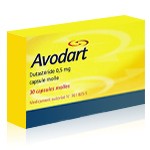Enlarged Prostate: Causes, Effects, Sexual Health and Diet


The prostate is a walnut-sized gland located just below the bladder in men, surrounding the urethra — the tube through which urine and semen pass. It plays a crucial role in male reproductive health by producing seminal fluid that nourishes and transports sperm. As men age, changes in the size and function of the prostate gland are common. One such change is benign prostatic hyperplasia (BPH), commonly known as an enlarged prostate. Though not typically life-threatening, it can significantly affect a man’s quality of life.
In this article, we will explore what causes an enlarged prostate, the potential complications it brings, its influence on sexual health, the impact of diet, and the role of the medication Avodart in managing the condition.
What Is the Real Cause of an Enlarged Prostate?
Benign prostatic hyperplasia is a non-cancerous increase in the size of the prostate gland. The exact cause of BPH is not fully understood, but it is widely believed to be linked to hormonal changes associated with aging. As men grow older, their testosterone levels decline, while levels of another hormone called dihydrotestosterone (DHT) often remain relatively high. DHT is a more potent form of testosterone that accumulates in the prostate and stimulates its growth.
Estrogen may also play a role. With aging, the ratio of estrogen to testosterone increases, which may enhance the prostate’s sensitivity to DHT. Together, these hormonal shifts contribute to the overgrowth of prostate cells, leading to enlargement.
Genetics can influence susceptibility as well. Men with a family history of BPH are more likely to develop the condition. Additionally, conditions like obesity, metabolic syndrome, and type 2 diabetes are associated with increased risk, suggesting that lifestyle and metabolic health are contributing factors.
What Happens If a Man Has an Enlarged Prostate?
As the prostate enlarges, it begins to compress the urethra, which can interfere with the normal flow of urine. This pressure does not appear suddenly, but gradually increases over time, often without noticeable symptoms until the enlargement is significant.
Common urinary symptoms include:
- Difficulty starting urination
- Weak or interrupted urine stream
- Frequent urination, particularly at night (nocturia)
- Urgency to urinate
- Feeling that the bladder isn't completely empty
While these symptoms can be bothersome, they are not inherently dangerous. However, if left untreated, BPH can lead to more serious problems such as urinary tract infections, bladder stones, or acute urinary retention, a painful condition where one cannot urinate at all and may require emergency intervention.
In some cases, chronic urinary retention can stretch and weaken the bladder muscle over time, reducing its ability to contract efficiently. This can lead to kidney damage if back pressure develops from urine retention.
Does an Enlarged Prostate Affect a Man Sexually?
Many men with BPH also report changes in their sexual function, although the relationship is complex and not entirely understood. BPH itself does not directly cause erectile dysfunction (ED), but the symptoms and their psychological impact can interfere with sexual performance and satisfaction.
Men with BPH may experience:
- Reduced libido (sex drive)
- Difficulty maintaining an erection
- Painful ejaculation
- Decreased volume of ejaculate
Some of these effects may be indirectly caused by the medications used to treat BPH, especially alpha-blockers and 5-alpha-reductase inhibitors, which can impact ejaculation and libido. On the other hand, the anxiety and sleep disruption caused by constant trips to the bathroom at night can reduce energy and desire for sexual activity.
It's important to differentiate between age-related sexual decline and that associated with BPH. While the two may coexist, addressing prostate issues can lead to improved quality of life and sexual well-being.
Enlarged Prostate Diet: Can Food Help?
Dietary habits have a significant impact on the progression and symptoms of BPH. Although diet alone cannot cure an enlarged prostate, it can help manage symptoms and support overall prostate health.
A diet for an enlarged prostate should focus on reducing inflammation and supporting hormonal balance. Nutrient-dense foods, particularly those high in antioxidants, omega-3 fatty acids, and phytonutrients, are beneficial.
Cruciferous vegetables like broccoli, cauliflower, and Brussels sprouts contain sulforaphane, which supports detoxification and may reduce prostate inflammation. Tomatoes are rich in lycopene, an antioxidant linked to reduced prostate size and improved urinary symptoms.
High consumption of red meat, saturated fats, and dairy has been associated with increased risk of prostate issues, while a diet rich in plant-based proteins, legumes, and whole grains may offer protective effects. Green tea and soy products have also been studied for their anti-inflammatory and hormonal benefits.
Hydration is essential, but timing matters. Drinking large amounts of fluids in the evening can worsen nocturia. Reducing alcohol and caffeine intake can also help control urinary urgency.
Maintaining a healthy weight, exercising regularly, and managing blood sugar levels through diet can lower the risk of BPH and improve symptoms in those already diagnosed.
The Role of Avodart in Treating an Enlarged Prostate
Avodart (generic name: dutasteride) is a medication used to treat BPH by addressing the hormonal causes of prostate enlargement. It belongs to a class of drugs called 5-alpha-reductase inhibitors, which work by preventing the conversion of testosterone to dihydrotestosterone (DHT).
Since DHT is the key hormone that stimulates prostate growth, reducing its production helps shrink the prostate and alleviate symptoms. Avodart is especially useful in men with significantly enlarged prostates and those who have not responded well to other treatments.
It is typically prescribed for long-term use, with symptom improvement often becoming noticeable after several months. Avodart has been shown to:
- Reduce prostate volume
- Improve urine flow
- Lower the risk of urinary retention
- Reduce the need for prostate surgery
However, like any medication, Avodart has potential side effects. The most common include reduced libido, erectile dysfunction, and decreased semen volume. Some men also report breast tenderness or enlargement. These side effects may persist for some time even after discontinuing the medication.
Interestingly, Avodart has been studied for its potential in reducing the risk of prostate cancer. While it may lower the likelihood of developing low-grade prostate cancers, there is concern that it could slightly increase the incidence of high-grade cancers, though the data is inconclusive. For this reason, it is typically not prescribed solely for cancer prevention.
Avodart can be used alone or in combination with alpha-blockers such as tamsulosin, which relax the muscles of the bladder neck and prostate to improve urine flow more quickly. Combination therapy tends to be more effective for men with severe symptoms or large prostates.
Conclusion
An enlarged prostate is a common and manageable condition that becomes increasingly likely as men age. Driven largely by hormonal changes — especially those involving DHT and testosterone — BPH can significantly impact urinary and sexual health, but does not increase the risk of prostate cancer.Understanding the symptoms and their underlying cause is crucial in seeking appropriate treatment. While lifestyle factors like diet, weight, and metabolic health can influence prostate health and help control symptoms, medical therapies are often necessary for moderate to severe cases. Among these, Avodart plays a pivotal role by targeting the hormonal drivers of prostate growth and effectively reducing gland size over time.
Importantly, men experiencing urinary or sexual symptoms should not ignore them or chalk them up to normal aging. Early diagnosis and a comprehensive treatment plan — including dietary adjustments, medication, and lifestyle changes — can dramatically improve quality of life and prevent complications.
Ultimately, BPH is a manageable condition with multiple treatment pathways. A personalized approach based on symptom severity, prostate size, and patient preference is key to effective management. Regular check-ups with a healthcare provider can ensure that treatment remains appropriate and effective as conditions evolve.
Medically Reviewed by Dr. Faride Ramos, MD
(Updated at Apr 6 / 2025)

